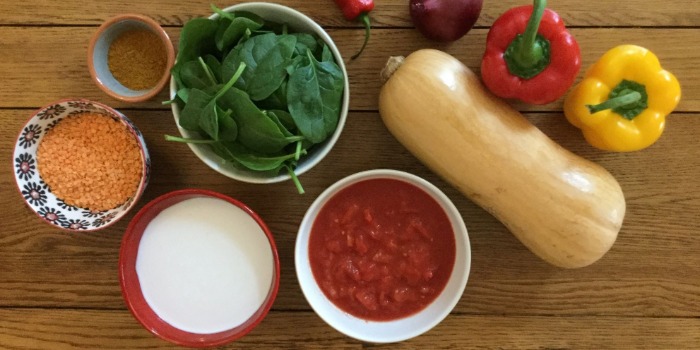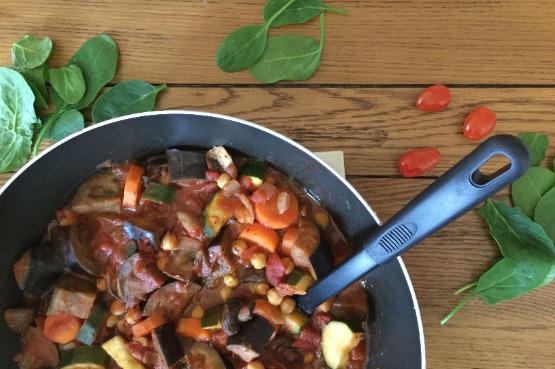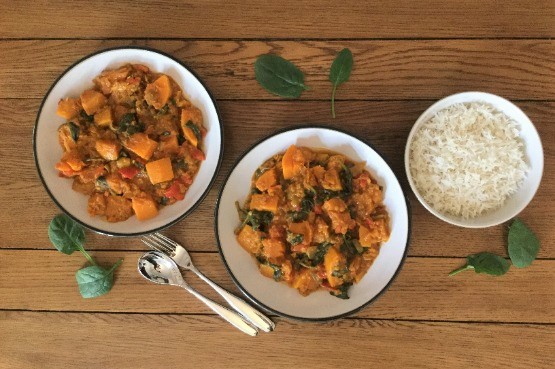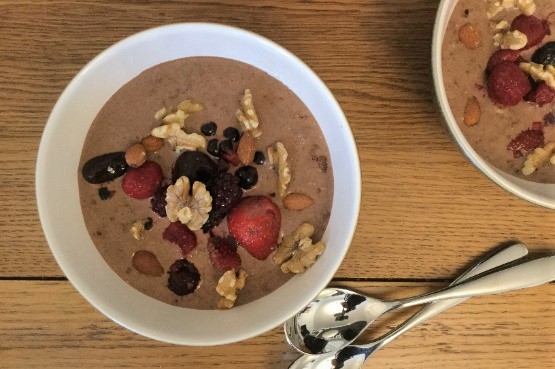Keeping Veganuary going: three tasty recipes
If you’re thinking of starting Veganuary and want some inspiration, why not try these three colourful plant-based recipes?
Read on to find out more, including some of the health benefits of each recipe.

1. Veggie pasta recipe
This vegan pasta recipe is a great mid-week meal. It’s packed with colour and nutritional value and is easy to make.
It’s also a good option for cutting down on the amount of saturated fats you eat. Saturated fats can increase the amount of bad cholesterol in your blood, which increases the risk of heart disease.
As well as vegetables, chickpeas, are included in this dish as a healthy source of plant-based protein. They also help to keep your muscles healthy.
Ingredients (serves 4)
- 1 onion
- 3 garlic cloves
- 1 aubergine
- 200g (7oz) chestnut mushrooms
- 1 courgette
- 2 large carrots
- 2 cans chopped tomatoes
- 1 can chickpeas (or 100g /3.5oz lentils)
- Wholegrain pasta
Method
- Heat a medium saucepan to medium heat. Then fry the diced onion and garlic with some olive oil until soft.
- Roughly chop the aubergine, mushrooms, courgette, and carrots, and add to the saucepan. Heat them for around 5 minutes, until they become soft.
- Add the chopped tomatoes and chickpeas. Then leave to simmer for 20 minutes until the sauce starts to thicken and come together.
- Cook pasta according to cooking instructions, then serve with sauce. Add vegan cheese as an optional extra.

2. Coconut vegan curry recipe (serves 4)
This colourful recipe has plenty of vegetables. It’s a great source of vitamins, minerals, and fibre too, which can help to maintain a healthy digestive system.
Fibre is an important ingredient which is good for your digestive health, and can help to prevent constipation. It may also help to reduce the risk of bowel cancer, which has been linked to diets rich in red and/or processed meats.
The lentils in this recipe are a cheap and low-fat source of fibre and protein too, and count towards your recommended five daily portions of fruit and vegetables.

Ingredients
- 1 red onion
- 3 garlic cloves
- 1 red chilli
- 1 sweet red pepper
- 1 yellow pepper
- 1 butternut squash
- Handful of spinach
- 200g (7oz) mushrooms
- 100g (3.5oz) lentils (or 1 can chickpeas)
- 1 can coconut milk
- 1 can chopped tomatoes
- 1 tbsp curry powder
- Rice of your choice
Method
- Heat pan over a medium heat with olive oil. Add diced onions, garlic, and chilli, and fry until soft. Then add in curry powder and fry for a further 2 minutes.
- Add chopped vegetables to the pan and fry them until they start to soften.
- Add in the coconut milk, chopped tomatoes and dry lentils with a dash of hot water. Allow to simmer for 45 minutes, adding more water if necessary, until the sauce becomes thick.
- Add spinach as you’re cooking the rice according to pack instructions.
- Serve with rice of your choice.
3. Vegan chia pudding recipe (serves 2)
This recipe can be used as a breakfast or dessert and includes ingredients with lots of nutritional value.
Despite their small size, chia seeds are a rich source of antioxidants, which can help to keep you healthy. They’re also an excellent source of omega-3 fatty acids that may lower our risk of heart disease?
Nuts and seeds are high in unsaturated fats and good for keeping a healthy level of good cholesterol. Having good cholesterol can help you to maintain a healthy heart.
The berries taste great in this recipe and contain a variety of vitamins and important nutrients, such as potassium, magnesium, and calcium.
And the coconut milk works really well as a diary-free alternative. It contains calcium and vitamin D to help keep your bones and teeth healthy.

Ingredients
- 50g (2oz) chia seeds
- 200ml (7oz) coconut milk (or alternative milk of choice)
- 2 tbsp cocoa powder
- Half a tsp vanilla extract
- Mixed berries and nuts to serve on top
Method
- Mix all the ingredients, except the berries and nuts, in a large bowl. Then cover the bowl with cling film and leave it in the fridge for at least four hours or overnight.
- Serve the pudding in bowls of choice, sprinkling mixed berries and nuts on top.
Do you know how healthy you truly are? Bupa health assessments give you a clear overview of your health and a view of any future health risks. You'll receive a personal lifestyle action plan with health goals to reach for a happier, healthier you.
-
Sources Sources
- Saturated fats and health. Scientific Advisory Committee on Nutrition. assets.publishing.service.gov.uk, published July 2019
- Qian et al. Association Between Plant-Based Dietary Patterns and Risk of Type 2 Diabetes: A Systematic Review and Meta-analysis. AMA Intern Med. 2019;179(10):1335-1344. doi:10.1001/jamainternmed.2019.2195
- Kim et al. Plant‐Based Diets Are Associated with a Lower Risk of Incident Cardiovascular Disease, Cardiovascular Disease Mortality, and All‐Cause Mortality in a General Population of Middle‐Aged Adults. Journal of the American Heart Association. doi.org/10.1161/JAHA.119.012865
- Vegetarian, vegan and plant-based diet. The Association of UK Dietitians. bda.uk.com, accessed December 2023
- The Eatwell Guide. GOV.UK. gov.uk, accessed December 2023
- Aune et al. Dietary fibre, whole grains, and risk of colorectal cancer: systematic review and dose-response meta-analysis of prospective studies. British Medical Journal. BMJ 2011; 343 doi: https://doi.org/10.1136/bmj.d6617
- Aykan et al. Red meat and colorectal cancer. Oncology reviews. Published online 2015 Dec 28. doi: 10.4081/oncol.2015.288https://www.ncbi.nlm.nih.gov/pmc/articles/PMC4698595/
- Protein and amino acid requirements in human nutrition. World Health Organisation (2007): Pg 13-15. Iris.who.int, accessed December 2023
- Oliviert Martinez-Cruz, Octavia Paredes-Lopez. Phytochemical profile and nutraceutical potential of chia seeds (Salvia hispanica L.) by ultra high performance liquid chromatography. Journal of Chromatography A. Volume 1346, 13 June 2014, Pages 43-48. doi.org/10.1016/j.chroma.2014.04.007
- Healthy eating for vegetarians and vegans. British Nutrition Foundation. Nutrition.org.uk, accessed December 2023
- Understand your cholesterol test results. Heart UK. Heartuk.org.uk, accessed December 2023
- Fruit and vegetables. British Nutrition Foundation. Nutrition.org.uk, published 2022
- Calcium Food Fact Sheet. The Association of UK Dietitians, bda.uk.com, accessed December 2023
About our health information
At Bupa we produce a wealth of free health information for you and your family. This is because we believe that trustworthy information is essential in helping you make better decisions about your health and wellbeing.
Our information has been awarded the PIF TICK for trustworthy health information. It also follows the principles of the The Information Standard.

More diet and nutrition articles
Did you find our advice helpful?
We’d love to hear what you think. Our short survey takes just a few minutes to complete and helps us to keep improving our healthy lifestyle articles.
Legal disclaimer
This information was published by Bupa's Health Content Team and is based on reputable sources of medical evidence. It has been reviewed by appropriate medical or clinical professionals and deemed accurate on the date of review. Photos are only for illustrative purposes and do not reflect every presentation of a condition.
Any information about a treatment or procedure is generic, and does not necessarily describe that treatment or procedure as delivered by Bupa or its associated providers.
The information contained on this page and in any third party websites referred to on this page is not intended nor implied to be a substitute for professional medical advice nor is it intended to be for medical diagnosis or treatment. Third party websites are not owned or controlled by Bupa and any individual may be able to access and post messages on them. Bupa is not responsible for the content or availability of these third party websites. We do not accept advertising on this page.







